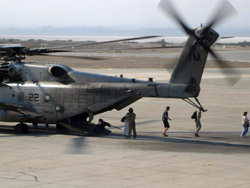The war in Lebanon is still going on and the number of victims continues to rise. According to the information of the Lebanese authorities, nearly 600 residents of South Lebanon have died, of which 200 are missing (they are being found under the ruins). This number doesn’t include the losses of “Hizballah”. Israeli general Dan Halutsi says that there is a great number of victims.
Thirty-three Israeli soldiers and ten residents have died. According to journalist Ali Al-Arab, the Jews were telling the residents to leave their homes before the bombings began. People were leaving in panic, but the Israeli forces were not only bombing the residencies, but also the refugees’ shacks.
Israel wasn’t able to seize the city of Binat-Jabil in South Lebanon and was defeated. They lost eight tanks (based on information from “Hizballah”). “Hizballah” has started using super missiles (100 kg), while the Israeli are using super air bombs.
The diplomatic front
The Israeli government rejected the UN deputy chief secretary’s proposal to end military operations for three days with the purpose of providing humanitarian aid to the residents of South Lebanon.
The Israeli announced that they had already opened a passage for humanitarian aid and wouldn’t make any more compromises. Israel feared that “Hizballah” might rearm itself in three days and the future bombings wouldn’t be that effective. Israeli soldiers are already being criticized by the government for not completing the military operations the right way.
The conference dedicated to the Arab-Israeli conflict held on July 26 in Rome didn’t lead to anything. The Minister of Foreign Affairs of Egypt Ahmed Abul Geit announced that the conference wasn’t what the Arabs were hoping for.
“Most of the countries participating in the conference wanted to declare ceasefire immediately,” he said.
Chief Secretary of the European Council Javier Solana said that the “ceasefire was closer than ever”. The final document includes positive sides too. First, the Lebanese people are getting humanitarian aid, the opening of the passage for the aid for transferring medicine and food, as well as the Lebanese government’s announcement to help.
Israeli Prime Minister Ehud Olmert announced that the military operations would end with the disarmament of “Hizballah”, the end of Israel’s missiles and the release of captured soldiers. The U.S. government is in favor of that, while Russia and the Arabic countries are against it. The opinion of the international community changed and hurt Israel and the U.S. after the bombing in Gana, killing 57 residents of which 34 were children. After that, Prime Minister of Lebanon Fuad Sinyor refused to meet with Condoleeza Rice, while France presented its plan to the UN Security Council. According to the plan, a ceasefire must be declared immediately between Israel and “Hizballah”. France demands a “stable ceasefire”. The U.S. believes that there will be a “stable ceasefire” after the defeat of “Hizballah”.
Israel declared ceasefire on July 30 at 2:48 a.m. so that it could conduct investigation on the bombing in Gana. But the war will start again in case Israel’s territory is bombed. Of course, this can be considered positive. However, by ending bombings, Israel widened the spectrum of land wars. By taking advantage of the end of bombings, thousands of Lebanese refugees moved from the south to the north-Beirut and Saida. Only one million people were evacuated.
The war will end in August
Some political analysts think that the war will be over in August. Perhaps that’s true. Prime Minister of Israel Ehud Olmert has announced that they need 10-14 days to end land wars. Meanwhile, “Hizballah” is resisting and Israel is accumulating new forces and techniques on the border of Lebanon with the purpose of breaking the resistance of “Hizballah” and go 20 kilometers forward to create a buffering zone.
Israel plans to allocate Lebanese forces and international forces (most probably on behalf of the UN). That must take place before the beginning of the negotiations. Declaring a ceasefire now would mean that “Hizballah” comes out victorious, but Israel and the U.S. won’t let that happen.
After a 48-hour ceasefire, Israel will start the bombings again with the purpose of demolishing the infrastructure of “Hizballah”, eliminate the missiles and storages, cut off all communications, which will end the transfer of weapons and forces from the South to the North. After that, it’s obvious that “Hizballah” will not be able to lead military operations and will be forced to negotiate. Israel also can’t go on like that because there are half a million Israeli hiding in the north and there are major economic losses. Judging from the abovementioned, it’s possible that the war will end before September 1.

